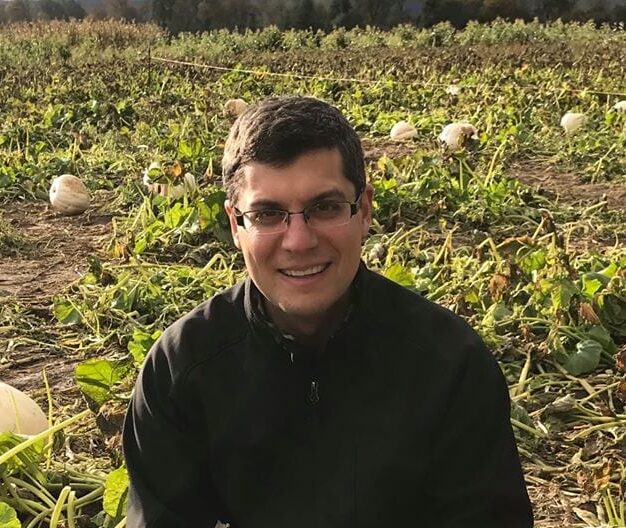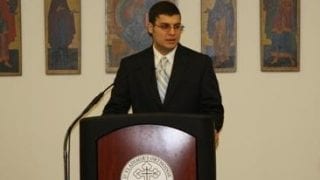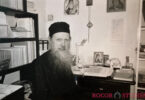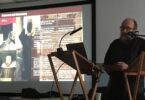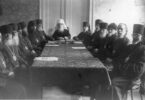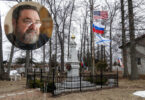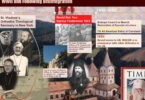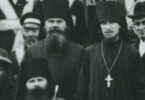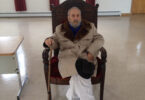Matthew Namee specializes in the history of Orthodoxy in America from the mid-19th to the mid-20th centuries. He’s written a lot about church history, both at his website and elsewhere, and he’s spoken at numerous conferences and events. His reconstructions of the environment in which Orthodox Churches operated in the first half of the twentieth century are important for a deeper understanding of the context of ROCOR’s operation. OrthodoxHistory.org is the website closest in its approach to history to ROCORstudies.org
Matthew is the former research assistant to Bill James, the legendary baseball author and Boston Red Sox executive. His work with Bill James introduced Matthew to the archives of the American periodical press which became a significant reference source for his studies on the history of Orthodoxy in the North American continent. He went on to earn a J.D. from the University of Kansas and serves as General Counsel and Chief Operating Officer for Orthodox Ministry Services. He and his wife Catherine and their children attend Holy Apostles Orthodox Church in Vancouver, WA (OCA). Matthew can be contacted at mfnamee [at] gmail [dot] com.
Thank you very much for taking the time to talk to us. I’d like you to introduce your unique project to our readership
I run a website called Orthodox History. I have run the website for over 10 years now. It’s a project of a loose organization that we call the Society for Orthodox Christian History in the Americas.
The website was originally focused on the history of Orthodoxy in primarily the United States. In recent years the focus has expanded to include Orthodoxy in the modern world, from the18th century to the recent past, and we’ve published tens of thousands of words. I’m the primary author on the website and the editor, but we have other people who’ve written articles from time to time – including you. So occasionally we get contributions from different people besides myself.
What criteria do you follow in posting material?
For most of the material, I’m the author, so I write about what I’m interested in. There was a period of time when I was researching very obscure figures from early American Orthodox history, so that was what I wrote about.
I had a stretch where I wrote about Orthodoxy in the US court system. That was because I was in law school and was focusing on that topic at the time.
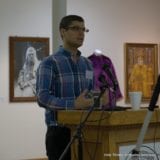
Presenting on American Orthodoxy in the Vision and Thought of Saint Tikhon at Holy Trinity Seminary in October 2015
In recent years, I’ve expanded the perspective of what we focus on, not just on the Americas, but globally, talking about the history of Orthodoxy in the modern world. Very recently, I’ve also published some statistical data that I’ve gathered on Orthodoxy, both in America and globally. I’ve been publishing very recently on a whole bunch of US government documents that I’ve collected that document the US government’s perspective and sometimes involvement in Orthodox affairs in the 20th century.
So, the criterion is basically what I find interesting. When we publish articles by other people, usually the articles have been commissioned by myself or one of the colleagues I work closely with. Rarely, we receive an unsolicited submission, but the website is not open to contributors.
If somebody sent something in, I would certainly consider it, but it would have to be very high caliber. I try to write and publish things that are interesting and even can be entertaining. So, while everything must be scholarly and sources must be documented, this isn’t an academic journal. We have a general readership.
In my experience when people invite me to give a talk on a historical or academic matter. I expect to encounter particular mythology. I’m not using mythology as a pejorative term, just as a technical term.
For example, there is a widespread perception that the Russian Church Abroad was right and all other Russian jurisdictions were more or less wrong. Whereas I’m coming from the idea that founders of other “jurisdictions” in the diaspora, like Metropolitan Platon, were misunderstood. He wasn’t protesting against church autonomy in 1924 because he was power-hungry; it was more complex than that.
But when I start trying to explain that to others, I have to think about how do I stay honest to academic standards and at the same time, how can I be positively received? That’s the sort of dilemma I’m facing, and I wonder if you can relate to this.
Absolutely, I can. You know, I have frequently presented material that may be controversial, and I have to be very careful and try to be even-handed in the way I present the material.
Recently, I have been publishing material on the relationship between the Ecumenical Patriarchate and the US government during the Cold War. That’s pretty controversial, and there’s a lot of somewhat explosive material in there. It’s really important, especially given the circumstances that we’re in today, that I take a balanced approach. I try to explain the context without taking sides. As much as I can, I let the evidence speak for itself. Then people can have their own opinions and come to their own conclusions. It doesn’t mean I can’t have an opinion or express myself, but I have to be careful not to be inflammatory or come across as editorializing.
Recently, I have been publishing material on the relationship between the Ecumenical Patriarchate and the US government during the Cold War. That’s pretty controversial, and there’s a lot of somewhat explosive material in there.
I tell stories. I share evidence. I have this approach of, “Hey, look what I found that’s interesting.” I find an interesting story or an interesting document that tells us something about who we are, about the history of our church, and I want to share it with people in a way that is engaging but doesn’t descend into the muck of opinionated disputes.
I felt like that when I commissioned a translation of Dr. Shkarovsky’s piece on the Russian Church Abroad and the Holocaust. When it was published, the combination of ROCOR and the Holocaust was mentioned in English for the first time. I didn’t know how people were going to perceive it, but I consider it a service to my church to talk about those things since we are fresh out of a polemic stage of mind. Until very recently, especially during the Cold War period, people mistook polemics for history.
What I do isn’t sacred history, it isn’t hagiography. The messy parts of our past are parts of our past, and I think the ignorance of those things doesn’t help us as a church. It isn’t necessarily for everyone, but as a church, we need to be aware of how we got where we are.
That’s a big driving question that underlies the work I try to do. I try to help get a better, clear understanding of how we got here, which I think is important if we want to move forward from here, make good decisions, and know how to interact with each other. We are a church with amnesia in many ways.
We rightly have this identity as the ancient Church, the Church of Holy Tradition, yet we’re largely ignorant of our history – especially our recent history. I think there’s a lot more awareness of what was going on during the period of the Ecumenical Councils than there is about what was going on 200 years ago. What has happened over the last 200 years has changed Orthodoxy as we know it — on a practical level, much more than what took place during the time of St. Basil the Great. We are living in the aftermath, in the context that was created in the last 200 years of church history, but as a church, we don’t know that history.
The whole idea of history is ambiguous because it involves working with complex facts. I often say that my work is the same as a craftsman. I’m not shooting for a providential explanation, but I’m trying as a craftsman, an archeologist, to explain my findings. Then spiritual people can go further with the material. But the tricky thing is that conclusions should not be immediate. When they are, we run into denial and difficult attitudes, because it’s not something people are ready to face.
I look at it like an individual’s own personal life: a person who ignores the negative things in their past and is in denial, turning a blind eye to the past. It doesn’t mean a person is not affected by those things. A lot of feelings can come from addressing things in one’s past.
I think the same thing applies to the church as an organism. We have all these things in our past, these complex, messy things in our history, and it doesn’t do us any good to pretend that they’re not there because they are, whether we like it or not. So, getting an understanding is hopefully a step on the way towards healing.
I really hope that our readers will take the time to familiarize themselves with this site and explore the phenomenon of American Orthodoxy, which from the 19th century was very bizarre and very unusual. We often have idealized views that Bishop (future) Tikhon united al Orthodox here in America, but we don’t realize that from the very beginning, the Greeks tried to avoid the Russians. Even Patriarch Tikhon was prohibited to visit St. Nicholas church in Manhattan; it was destroyed by the collapsed twins’ towers. He wasn’t allowed on the grounds of St. Nicholas church, owned by a trust. I understand the Greeks tried to get their priests from islands “through the head of Russian bishops,” effectively avoiding the Russian presence.
It wasn’t that particular church building; it was one that predated that church, it was a different church. But that’s correct — the Greek churches in America were organized from the very beginning independently of the Church of Russia. Generally speaking, they were loosely tied either to the Church of Greece or to the Ecumenical Patriarchate, but for all practical purposes, they were independent entities that were run by their boards of directors or their boards of trustees.
We have all these things in our past, these complex, messy things in our history, and it doesn’t do us any good to pretend that they’re not there because they are, whether we like it or not.
It would frequently lead to strange, unusual occurrences with regard to priests because the board of directors would hire or fire the priest. The priest was just treated as an employee. This was the case, not just in the Greek churches, but in many others.
There’s an example I’ve written about, a Serbian church that decided to get rid of its priest, so they needed a new priest. They put an advertisement in a Serbian-American newspaper, advertising for other priests who were in the area, in the country, “Hey, we have a job available.” They were trying to sort of poach a priest from another Serbian parish in America, and when that failed, they sent one of their trustees, one of the laymen from their parish, they sent him overseas to try to go and find a priest.
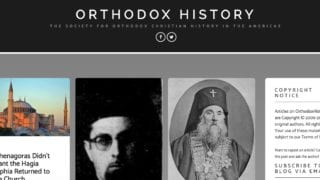 This was not an uncommon occurrence in that day and age. The Russian church was different because the Russian church did have an Archdiocesan structure. In the Russian church, the priests would come and do a tour of duty in America; they might come for 5 or 6 years or something, but a lot of them would return back to Russian after a period of years. That was always the plan, and it even happened with saints, like Sts. Frs John Kocuhrov, Alexander Khotovitskii, and others — even St. Tikhon himself never had any intention of staying in America. It was a tour of duty; it was a step along the way in their ecclesiastical careers. Not to say anything negative about that; it was how the church was structured.
This was not an uncommon occurrence in that day and age. The Russian church was different because the Russian church did have an Archdiocesan structure. In the Russian church, the priests would come and do a tour of duty in America; they might come for 5 or 6 years or something, but a lot of them would return back to Russian after a period of years. That was always the plan, and it even happened with saints, like Sts. Frs John Kocuhrov, Alexander Khotovitskii, and others — even St. Tikhon himself never had any intention of staying in America. It was a tour of duty; it was a step along the way in their ecclesiastical careers. Not to say anything negative about that; it was how the church was structured.
That’s very clear. It would warrant another conversation, focusing specifically on the American Orthodoxy and the wild west spirit of Agapius Honcharenko and other “heroes” of American Orthodoxy in the late nineteenth and twentieth century.
Have you covered any Russian Church Abroad history on your website?
Not a lot, because most of my earlier work was focused on the period before ROCOR existed in America. Lately, I’ve branched out into more recent global Orthodox history. I don’t have many ROCOR-specific articles other than the one you published on my site. I mention ROCOR in several articles, but they aren’t focused on ROCOR history. My article “The Nine Years that Almost Destroyed the Orthodox Church” puts the origins of ROCOR in the broader context of what was happening in global Orthodoxy. There’s also one that focuses on a court case involving a parish that left ROCOR for HOCNA. There is an article on another court case, this one involving a parish that jumped to the ROCOR from the OCA. There are a couple of other more ROCOR-centric articles by others – one by a guest author and one by my colleague Fr. Andrew Damick (on ROCOR’s Bulgarian Diocese in Exile).
Matthew, thank you very much for this conversation. I hope this will drive some well-deserved attention to your unique site. I am honored to be on your advisory board. I support your work 100 percent, and I’m very glad to know that it’s out there and you’re still enthusiastic about it.
Thank you very much.
Conducted by Deacon Andrei Psarev

